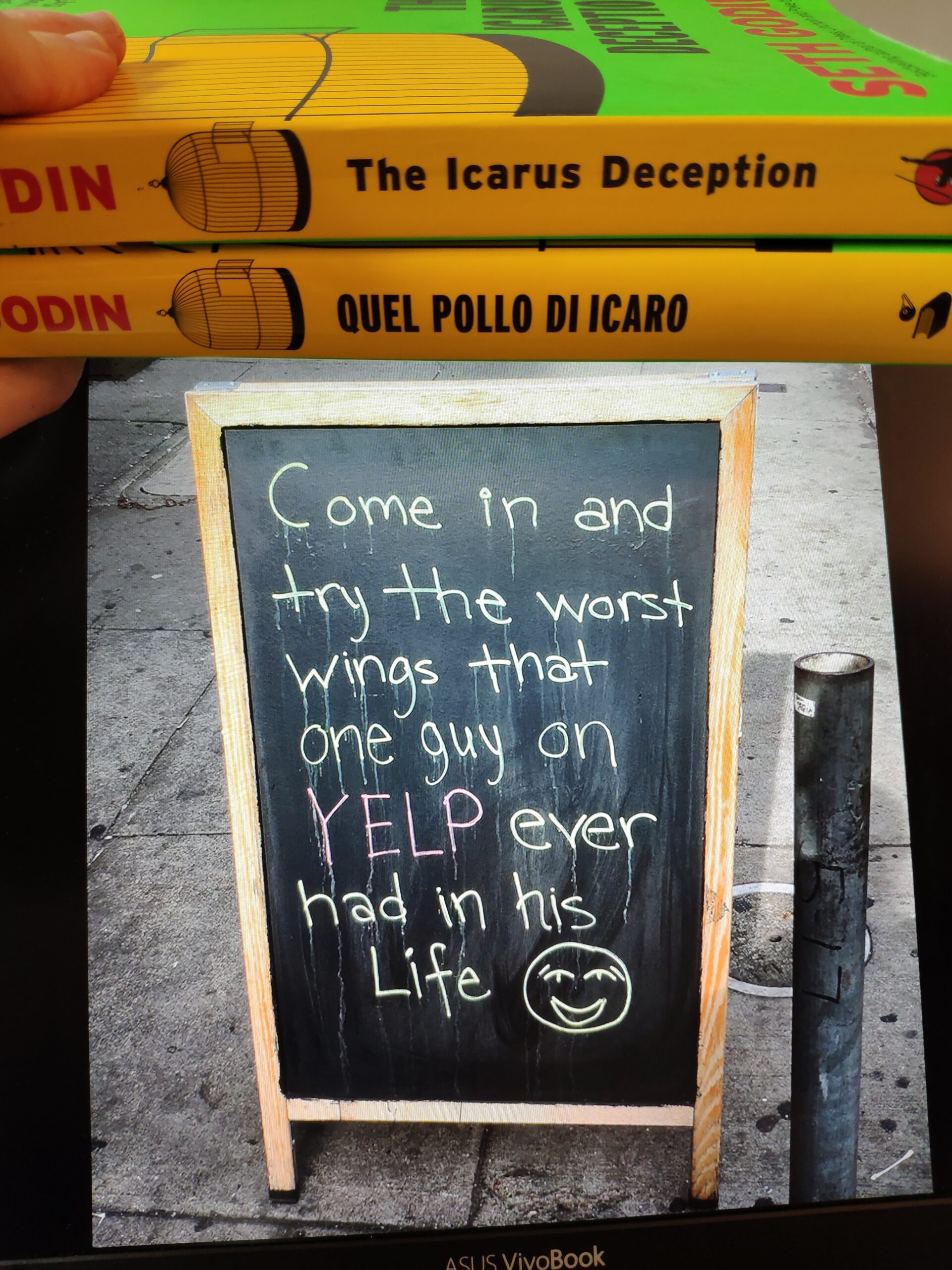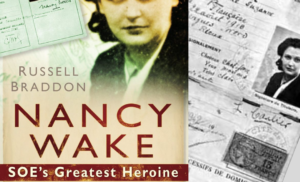
Icarus, pt. 2 – Seth Godin
"EDU-CASTRATION" - THE PURPOSE OF EDUCATION: on The Icarus Deception, by Seth Godin, Part 2
“We can teach people to make commitments, to overcome fear, to deal transparently, to initiate, and to plan a course.
We can teach people to desire lifelong learning, to express themselves, and to innovate.
And just as important, it’s vital we acknowledge that we can unteach bravery and creativity and initiative. And that we have been doing just that.
School has become an industrialized system, working on a huge scale, that has significant byproducts, including the destruction of many of the attitudes and emotions we’d like to build our culture around.
In order to efficiently jam as much testable data into a generation of kids, we push to make those children compliant, competitive zombies.”
This quote from Seth Godin’s book, The Icarus Deception, reminds me of what Italian author Salvatore Brizzi calls “edu-castration”, referring to the brainwash and limiting education we’ve been subdued, that keeps controlling new generations (luckily the Internet offers the chance to explore different and alternative views, and not just the institutional ones).
Schools and universities train subordinates, people who won’t question the institutions or the corporations that made the rules. I don’t intend to talk about this matter, as others, like Godin and Brizzi, do it best. I’d rather focus on the light at the end of the tunnel.
This is why I couldn’t write just one article about The Icarus Deception. This book is filled with precious gems to cherish, so many that I couldn’t do a proper inspiring quote selection: each page has too many and I couldn’t possibly quote the whole book!
The reason why they teach us to work for others and obey the boss is now clear to everyone: it’s easier to govern zombies than artists – as the latter are individuals who act according to their heart, singularity and uniqueness. The New Economy has now become old, that’s why it’s collapsing under everyone’s eyes. There are no more safe jobs, so it’s up to us to choose (self)destruction by fighting changes, or embrace them and jump, finally counting on our own and choosing ourselves, rather than waiting for our dream company to pick our CV and us.
Times have changed: “The myth that the CEO is going to discover you and nurture you and ask you to join her for lunch is just that, a Hollywood myth.
Once you understand that there are problems just waiting to be solved, once you realize that you have all the tools and all the permission you need, then opportunities to contribute abound. The opportunity is not to have your resume picked from a pile but to lead.
When we take responsibility and eagerly give credit, doors open. When we grab a microphone and speak up, we’re a step closer to doing the work we’re able to do.
Most of all, when you buckle down, confront the lizard* and ship your best work, you’re becoming the artist that you are capable of becoming.
No one is going to pick you. Pick yourself.”
*It refers to the voice in our heads, always telling us to step back, be careful, go slow, compromise, and so on.
(to be continued...)
«Dobbiamo poter insegnare come assumerci le nostre responsabilità, superare le paure, essere sinceri, come avviare e pianificare un progetto.
Dovremmo poter essere in grado di educare le persone all'importanza di un'apprendimento che non si fermi sui banchi di scuola, insegnando loro a esprimere se stessi e a innovare.
Purtroppo finora è stato fatto l'esatto contrario, ovvero ci è stato insegnato come non essere coraggiosi, creativi o intraprendenti.
E per stipare la maggior mole possibile di informazioni verificabili tramite semplici test in ogni nuova generazione di bambini, hanno spinto questi ultimi a trasformarsi in zombie docili e competitivi.»
Questa frase tratta da Quel Pollo di Icaro di Seth Godin mi ricorda il concetto di educastrazione di cui ha scritto l’autore Salvatore Brizzi, riferendosi al lavaggio del cervello e all’educazione limitante cui siamo stati sottomessi e che continua a controllare le nuove generazioni (per fortuna, grazie a Internet, i giovani hanno oggi più possibilità di conoscere punti di vista diversi da quelli istituzionali).
Le scuole e le università formano dipendenti, persone che pensano secondo i dettami delle istituzioni e delle multinazionali, le quali stabiliscono le regole. Ma non è mia intenzione scrivere di questo argomento, essendoci penne migliori come Godin e Brizzi, piuttosto voglio focalizzarmi sulla luce in fondo al tunnel.
Per questo non ho potuto scrivere soltanto un articolo su Quel Pollo di Icaro. Il libro è pieno di gemme preziose da curare, talmente tante che non ho potuto fare una vera e propria selezione di citazioni “ispiranti”, in quanto ogni pagina ne è piena e avrei dovuto ricopiarlo tutto!
Perché ci insegnino a lavorare per altri e obbedire al capo è ormai chiaro a tutti: è più facile governare degli zombie che degli artisti, i quali sono individui che fanno le cose solo secondo il loro cuore, la loro individualità e unicità.
La New Economy è ormai old, e infatti sta collassando sotto gli occhi di tutti. Il lavoro sicuro non esiste più e dobbiamo scegliere noi se seguire la strada della (auto)distruzione, opponendoci ai cambiamenti, o abbracciarli e fare un salto nel vuoto, contare finalmente su noi stessi e scegliere noi stessi, senza aspettare invano che l’azienda dei nostri sogni scovi il nostro CV e ci scelga.
Ormai i tempi sono cambiati: «Il sogno di essere scoperti, consigliati e invitati a pranzo dal proprio agente è soltanto un mito hollywoodiano. Quando vi renderete conto che ci sono problemi in attesa di essere risolti eche siete inpossesso di tutti gli strumenti e i permessi necessari per superarli, allora le occasioni per offrire il vostro contributo non mancheranno. E l'occasione di cui parlo non è che qualcuno scelga il vostro curriculum, ma quella di diventare un leader.
Quando ci assumiamo le responsabilità di quanto facciamo e siamo disposti a riconoscere i meriti altrui, le porte davanti a noi si spalancano. Afferrare il microfono e far sentire la nostra voce è il primo passo per cominciare a fare quello che siamo capaci di fare.
E, soprattutto, quando ci impegniamo in qualcosa e produciamo il nostro miglior lavoro, diventiamo quegli artisti che sappiamo di poter diventare.
Ma, soprattutto, quando ci mettiamo all’opera, affrontiamo il nostro cervello da lucertola* e facciamo il nostro lavoro al meglio, diventiamo gli artisti che siamo in grado di essere.
Nessuno verrà a cercarvi, sceglietevi da soli.»
* Si riferisce alla voce nella testa che ci dice di tirarci indietro, fare attenzione, rallentare, scendere a compromessi, etc.
(continua...)




